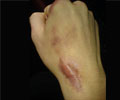New research reports that patients treated with less invasive - or non-ablative - lasers showed significant improvement of mild to severe acne scars with fewer side effects common with ablative procedures, such as facial resurfacing, dermabrasion and chemical peels.
There’s good news for adults with acne and resultant facial scarring. A new study in the current issue of Dermatologic Surgery, the medical journal of the American Society for Dermatologic Surgery, reports that patients treated with less invasive - or non-ablative - lasers showed significant improvement of mild to severe acne scars with fewer side effects common with ablative procedures, such as facial resurfacing, dermabrasion and chemical peels.
Until recently, ablative procedures were used to treat acne scars by removing the outer layers of skin (epidermis and top dermis) to promote growth of new, smoother and more uniform layers. However, possible adverse events include infection, bleeding, pigment changes and permanent scarring.In the study, dermasurgeons at Northwestern University Medical Center in Chicago used two different non-ablative lasers, Lyra and CoolTouch II, to treat 12 patients with mild to severe acne scarring. The objective was to evaluate the effectiveness of the less invasive lasers as an alternative treatment.
“Non-ablative laser treatments are becoming popular because they significantly decrease risks for adverse events and reduce the need for post-op care,” said lead author Dina Yaghmai, MD. “These laser systems have long wavelengths that allow deep dermal penetration, and protect the epidermis while heating a large volume of dermal tissue,” she said. Yaghmai added that non-ablative lasers heal acne scars by remodeling the skin through stimulation of collagen production.
“This study demonstrated that both non-ablative laser systems are safe and effective for treating acne scars,” said Dr. Yaghmai. “As with all non-ablative treatments for acne scarring, it is crucial that patients have realistic expectations of the degree of improvement they can achieve.”











